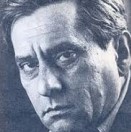Géza Páskándi
GÉZA PÁSKÁNDI (1933–1997) was born in the Hungarian village of Szatmárhegy in Transylvania. He received his degree in law from Kolozsvár and began to work for papers published in Hungarian in Romania. As so many of his peers sympathising with the Hungarian Revolution of 1956, Géza Páskándi was imprisoned in 1957. He was sentenced to six years of forced labour imprisonment from which he was released in 1963 and could move to Hungary in 1974. Similar to many other writers who changed their homeland, but not their language, moving to Hungary brought a new blossoming out in Páskándi’s career. His intellectual and avant-garde poetry: Tű foka (Eye of the Needle, 1972), his evoking figures of Transylvanian cultural history: Vendégség (Feast), Tornyot választok (Selecting a Tower), Szekértől elfutott lovak (Horses Running Away from the Wagon), as well as his grotesque and biting one-act plays, comedies and “verse-garlands” all exhibit originality and playfulness in language. He is the winner the Attila József Prize in 1977, Kortárs Prize in 1992, Kossuth Prize in 1993, and Ernő Szép Prize (after his death) in 1996

